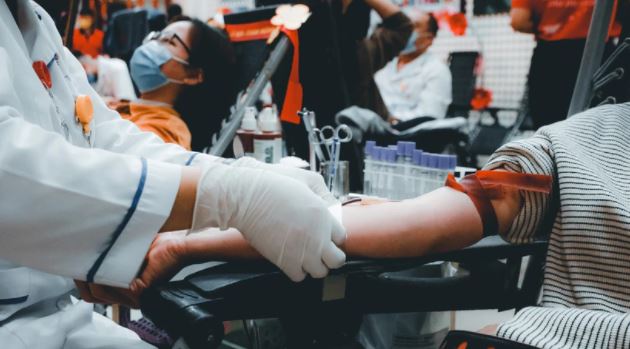Seoul, August 21 (Reuters) – From Seoul to Paris, and Moscow to Bangkok, concerned citizens are lining up for vaccine shots as COVID-19 case numbers swell. That may ease pressure on stretched hospitals around the world, but with it comes a hangover – a severe shortage of blood donors.
A number of countries don’t allow people who have just been vaccinated to give blood, as well as banning those in recovery from coronavirus. With others simply staying home as new infections rise, doctors say donor pools have shrunk to alarmingly low levels, menacing urgent operations.
For similar articles, join our Whatsapp group for the latest updates. – click here
In South Korea, now grappling with record cases, donors can’t give blood for seven days after a COVID-19 vaccine shot – and supply is down to just 3.2 days, as of Wednesday, from 6.5 days’ worth this time last year, according to the Korean Red Cross.
The Korean Medical Association (KMA) has launched a blood drive, starting with doctors themselves, warning that patients in need of urgent surgery or transfusions could face emergency situations, KMA spokeswoman Park Soo-hyun told Reuters.
“There have been increasing times when hospitals notify us of postponement of surgeries or treatments and crowding due to lack of blood,” Park said.
Recurrent waves of infections, driven by the highly transmissible Delta variant, and extension of lockdowns have started taking a bigger toll on donations, according to a Reuters review of the situation in different countries.
In Thailand, confirmed cases topped 1 million on Friday with authorities reporting record increases in deaths in recent weeks.
“Due to the COVID situation, not many people are donating blood so there is not enough and some surgeries have to be postponed,” said Piya Kiatisewi, a bone cancer surgeon at Lerdsin Hospital in Bangkok.
‘SEPTEMBER WORRIES’
Like South Korea, Russia prohibits blood donations from the fully vaccinated – but for a whole month, not just seven days. It also doesn’t accept blood from those in the middle of COVID-19 vaccination cycle.
The Kommersant business daily reported last week that donor activity in Russia has slumped, hit by the vaccination campaign, with blood service workers in six different regions reporting the problem to the paper.
In the United States, supplies of donated blood – already strained by the pandemic – tightened further in the spring as hospitals ramped up surgeries that had been on hold, according to Dr. Claudia Cohn, chief medical officer at AABB, previously known as the American Association of Blood Banks.
Under U.S. guidelines, people receiving authorized vaccines do not have to wait before donating blood, but individuals given a different type of vaccine, possibly in another country, need to wait 14 days.
To be sure, in western Europe concerns over vaccination-hit donations have been exacerbated by the traditional summer holiday period.
France’s blood supply agency, the Etablissement Francais du Sang (EFS), said stocks were too tight for comfort. It said there are 85,000 red blood cell bags in reserve, below a comfortable level of 100,000 or more.
“No sick person will miss out on a transfusion but we are worried for September,” an EFS spokesperson told Reuters, when the volume of surgical operations would typically increase.
In Italy, the National Blood Centre said there were worrying shortages in a number of regions, including Lazio, centred on the capital Rome, which had led some hospitals to postpone planned operations to conserve stocks for emergencies. It blamed the shortfall mainly on many people being away on holiday and a lack of staff in some collection centres.
‘AFRAID TO DONATE’
Across Europe, donation levels have also been plagued by uncertainty over whether people can give blood if they have not been vaccinated, officials in various countries said. Spain’s Health Ministry, for instance, issued a call for donations this week, telling people it’s safe to donate during the pandemic.
In Greece, “People are afraid to go and donate blood to hospitals because of the coronavirus”, said Konstantinos Stamoulis, scientific director of Hellenic National Blood Center in Athens. “There are days when there is a reduction of up to 50% in blood donations compared to 2019,” he said.
Back in Asia, many countries are now facing their most severe outbreak of coronavirus so far amid the Delta variant surge.
In Vietnam, the country’s National Institute of Hematology and Blood Transfusion said it could meet only 50-70% of demand.
“We haven’t been able to deploy mobile donor centres,” said Le Hoang Oanh, head of the blood transfusion centre of Cho Ray Hospital in Ho Chi Minh City, Vietnam’s coronavirus epicentre.
“Instead, we have to call for donors to go to our permanent centres, which is a challenge given the movement restrictions in the city.”
Subscribe to our Whatsapp channel for the latest updates on the news you need to know




























































